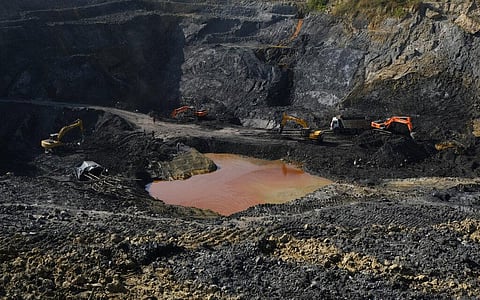

BHUBANESWAR: With Odisha accounting for the country’s 9.7 per cent greenhouse gas (GHG) emission, ‘just transition’ would be the right path for the state to reduce carbon emission as any unplanned shift to sustainable energy source could potentially impact nearly a million jobs in different sectors, revealed a new study on Tuesday.
“An unplanned energy transition can potentially impact over 9.3 lakh formal and informal jobs in coal mining, power and steel sectors. Angul-Dhenkanal, Keonjhar and Jharsuguda-Sundargarh-Sambalpur mining and industrial clusters are the key regions that will be affected by this energy transition,” said a report titled ‘Just Transition in Odisha for Green Growth and Green Jobs’ released by the International Forum for Environment, Sustainability and Technology (iFOREST) here.
As per the report, Odisha is a key stakeholder in India’s net zero goals considering the trajectory of its industrial growth and the GHG emission level. However, its approach to energy transition must focus on creating opportunities for green jobs and promoting sustainable economic growth.
It stated that the state’s GHG emissions have increased at a compound annual growth rate of over 5.6 per cent in the last one decade and is projected to reach about 665 MMTCO2e by 2035-36 in a business-as-usual scenario. Coal-based power plants and the steel sector contribute 84 per cent of Odisha’s total emissions. The state’s per capita emission of 6.9 tonne is also more than double the country’s average of 2.8 tonne. And even if the state’s GSDP grows at eight per cent with a 45 per cent reduction in emission intensity from the 2005 level, it will still be around 493 MMTCO2e.
The report underlined the state needs a fair and inclusive shift towards a low-carbon economy that considers the needs of all people affected by the transition. “We have to be progressive as we move with the times. However, it has to be a collective effort as we cannot ignore those who are going to be affected in this transition,” said deputy chief minister KV Singh Deo while releasing the report.
Energy secretary Hemant Sharma said the justice in Just Transition has to be about the people whose jobs will be impacted. Accordingly, it should be done in a planned manner.
“The state needs to develop a comprehensive Just Transition policy guiding green investments in fossil fuel dependent districts, strengthening the ecosystem for skilling and jobs and mobilises finances,” said president and CEO of iFOREST Chandra Bhushan.